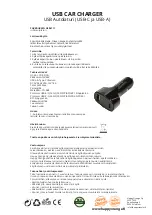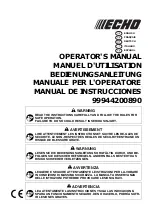
ACEWELL has several speed sensors; the unit may include one of them. If
the model is intended to be connected to a gearbox electronic speed output to
obtain the speed reading, no speed sensor will be included.
Reed Speed Sensor and Magnet
:
1.
This sensor is universal sensor for motorcycle; find a rotating part to
install magnet (for example disk, sprocket or driveshaft) and a location to
install the sensor where it can be aligned to the magnet.
2.
Align the center of the magnet to either of the sensor marking lines or the
end of the sensor. The magnet must not travel down the body of the
sensor.
3.
Installing the sensor parallel to the vibration direction creates optional
anti-vibration effect.
4.
Make sure the gap between the magnet and the sensor is within 8mm.
Hall Effective Speed Sensor and Magnet
:
1. This is universal sensor for ATV or motorcycle front or rear wheel
installation. For some fitments an accessory speed sensor holder may need
to be purchased.
2. Find a rotating part to install magnet (for example disk, sprocket or
driveshaft) and a location to install the sensor where it can be aligned to the
magnet.
3. Align the center of the magnet to center of side face of the sensor.
4. Make sure the gap between the magnet and the sensor is within 5mm.
Specific Hall sensors:
Cable drive adaptors for most bikes originally fitted with cable driven
speedometers or odometers are available. When using these cables it is
necessary to divide the circumference setting by the number of rotations of the
cable per rotation of the wheel, please try to set 730mm as the wheel
circumference firstly if you are using this type sensor.
Temperature Sensor and Sensor Tube:
1. The unit includes a PT1/8 temperature sensor, if you want to use the sensor;
you may have to purchase a suitable water pipe temperature sensor tube to
install the sensor on some bikes.
2. Cut the water pipe, insert the temperature tube into the pipe and secure it by
attached pipe clamps.
3. Screw the sensor into the tube.
4. If your vehicle is fitted with a thermostat that stops water flowing to the
radiator when the engine is cold, you will not get a reading until the
thermostat opens.
5. Custom sensors are available for carbureted bikes to replace the original
sensor.
FUNCTIONS
RPM: Digital Tachometer
1. It displays digital tachometer up to 19,990RPM and displays 19,990rpm
when tachometer is over 20,000rpm.
2. It has 2 wires to pick up RPM signal, the yellow wire is to connect to Plug
or Ignition coil,
and grey wire is for signal from ECU.
Shift Warning RPM
1. The function enables you to set up a shift warning RPM.
2. The
indicator lights up when RPM reaches setting value.
3. The RPM indicator turns off or stops lighting up after you shift gear.
MAX RPM: Maximum Tachometer
Displays highest tachometer achieved since last Reset operation.
km/h or MPH: Speedometer
1. Displays speed meter up to 399.9 km/h or 248.5 MPH.
2. The maximum frequency from speed sensor is 5K Hz.
3. With a small wheel size and large number of pulses per wheel revolution it
may not be possible to display very high speeds.
MAX: Maximum Speed Meter
Displays highest speed achieved since last Reset operation.
AVG: Average Speed Meter
It calculates average speed from last RESET. The AVG is calculated from
TRIP be divided by RT.
TRIP 1 / 2: Trip Meter 1 / 2
TRIP function accumulates trip distance since last RESET as long as bike
/vehicle is moving.
TRIP 12: Trip Meter 3
1. TRIP-3 function appears and starts to accumulate trip distance
automatically after low fuel warning LED is turned on.
2. TRIP-3 be reset to zero automatically when fuel is added to over the low
fuel warning level.
ODO: Odometer
1. ODO accumulates total distance traveled.
2. ODO data is adjustable when it is less than 30km (18.6 Miles), after that it
is stored in memory and cannot be reset.
RT: Riding Timer
1. Calculates total running time since last RESET.
2. Counter automatically begins with movement.
TT: Total Riding Timer
1. Calculates total riding time from the beginning of the bike.
2. TT data is stored in memory, and cannot be reset.
HRTT: Total Hour Meter
1. Calculates total engine operation time since installation RESET.
2. Count automatically begins with engine starting.
3. HRT data is stored in memory, and cannot be reset.
AM/PM: 12/24 hour Clock
It displays 12 or 24 hour current time.
℃
/
℉
: Temperature Meter
1. It measures and displays from 0
℃
-180
℃
/ 32
℉
-356
℉
.
2. It displays -L-
℃
or -L-
℉
when temperature is lower than 0
℃
(32
℉
) or
disconnected temperature sensor, and displays -H-
℃
or –H-
℉
when
temperature is over 180
℃
or 356
℉
.
3. The digits of temperature on LCDs flash when the thermistor sensor detects
temperature higher than the preset warning temperature. The warning digits
flash back again after 10 secs. when switching to other information display
or tuning out.
MAX
℃
/
℉
: Maximum Temperature
Displays highest temperature achieved since last Reset operation.
V
:
Digital Voltage and Battery Warnings
1. It checks bike’s battery and charging system’s health.
2. It has 3 modes to be set, on, oFF, and HI, all 3 modes range from 11.0V
to 17.0V.
3. The “on” means battery warning on voltage, when the voltage falls below
this the LED will flash.
4. The “oFF” means battery warning off voltage, oFF voltage must be higher
than on voltage.
5. The “HI” means battery high voltage, it comes on to warn that the battery
over-charges.
:
Gear Indicato
r
1. The gear indicator calculates gear by comparing speed and RPM then
displays gear position.
2. User has to train the gear indicator before use it.
Bar-Fuel or
Temperature Gauge
1. Has 5 bars to indicate how much fuel remains, or the temperature status.
2. To use as a fuel gauge, the user enters the sender ‘empty’ resistance
between 10 and 1000 ohms and the sender ‘full’ resistance between 10 and
999 ohms. The computer produces a linear scale of bars between these two
resistances. When less than 10% fuel remains the gauge will flash and the
warning LED if fitted will light.
3. To use as a reserve indicator, connect the reserve switch to the input and
put into “rES” mode, the bar gauge will automatically be switched to
temperature gauge. When the switch pulls the input to –ve the LED icon
will light. On vehicles with temperature based sensors a 68 ohm 5w
resistor needs to be connected between the input wire and 12v (switched).
4. If the bar-fuel gauge is not required they can be switched off. Bar gauge
will display for bar-temperature gauge instead of bar-fuel gauge as if the
temperature meter set at on status.
5. The specific setting and waring flash of bar-fuel and bar-temperature
gauge on function cutover among “on”, “OFF”, and “rES” of bar-fuel are
Fuel
Mode
Temp.
Mode
Bar
Display
Symbol
Flash
LED
Light Up
ON
°
C
°
F
OFF
HI
OFF
°
C
°
F
OFF
No Bar
Display
No Bar
FLASH
No LED
Light Up
HI
rES
°
C
°
F
OFF
No Bar
Display
HI






















